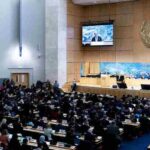
The COP29 Climate Summit in Baku experienced moments of chaos this Saturday during the extension of the negotiations. The delegations of the island states and the least developed countries have abandoned the negotiating table due to the lack of attention to their demands, according to their spokespersons.
Following the widespread rejection of the proposed agreement, especially on the issue of climate financing for disadvantaged countries, tension has risen to near-breakdown levels when delegations from island countries (such as the Marshall Islands) and those from the group of less developed states (many of them African, but also Afghanistan, Nepal, Hatí or Cambodia), have stood up and left the talks. To achieve an agreement, a quorom of two-thirds of the 198 participating states is needed: about 130 parties.
The presidency’s offer to agree on a common text marked the direct contribution of the rich states to the poor ones at 250,000 million euros annually. Many developing countries called this “a joke.” So this Saturday a kind of bargaining to see how far one or the other would give before giving the go-ahead.
Far from advancing, Saturday’s day got worse when these two groups decided to put even more pressure by leaving the room. It didn’t mean that everything blew up, but the conversations were paralyzed until they were able to sit down at the table again.
“We are still here,” they later declared from the group of island states (AOSIS). “But for conversations to be productive, the voices of the most vulnerable must be heard. “We remain committed to reaching an agreement that does not plunge the world into deeper danger.”
And, to complete the chaotic picture, a delegate from Saudi Arabia has been hunted editing one of the documents presented by the COP presidency for the final agreement, as revealed The Guardian. The Saudi delegation has been described as a “wrecking ball” at this summit. Its official spokesperson in a plenary session made it clear that the petrostate would not tolerate any text that “singled a specific sector such as fossil fuels”, that is: oil, coal and gas whose intensive use has generated the concentration of greenhouse gases. greenhouse effect responsible for climate change.
Source: www.eldiario.es

